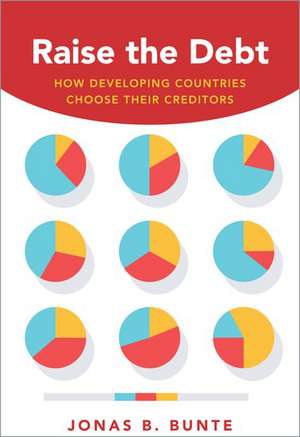Raise the Debt: How Developing Countries Choose Their Creditors
Autor Jonas B. Bunteen Limba Engleză Paperback – 21 mar 2019
| Toate formatele și edițiile | Preț | Express |
|---|---|---|
| Paperback (1) | 198.68 lei 31-37 zile | |
| Oxford University Press – 21 mar 2019 | 198.68 lei 31-37 zile | |
| Hardback (1) | 587.56 lei 31-37 zile | |
| Oxford University Press – 21 mar 2019 | 587.56 lei 31-37 zile |
Preț: 198.68 lei
Preț vechi: 218.77 lei
-9% Nou
Puncte Express: 298
Preț estimativ în valută:
38.02€ • 41.29$ • 31.94£
38.02€ • 41.29$ • 31.94£
Carte tipărită la comandă
Livrare economică 11-17 aprilie
Preluare comenzi: 021 569.72.76
Specificații
ISBN-13: 9780190866174
ISBN-10: 0190866179
Pagini: 296
Dimensiuni: 231 x 150 x 23 mm
Greutate: 0.39 kg
Editura: Oxford University Press
Colecția OUP USA
Locul publicării:New York, United States
ISBN-10: 0190866179
Pagini: 296
Dimensiuni: 231 x 150 x 23 mm
Greutate: 0.39 kg
Editura: Oxford University Press
Colecția OUP USA
Locul publicării:New York, United States
Recenzii
Bunte reminds us that governments' borrowing is often multifaceted: they may access credit from international financial institutions, western governments, BRICS governments or private capital markets. Raise the Debt highlights the strategic nature of developing countries' choices among creditors. Through a combination of detailed country case studies, rich interview evidence and careful statistical analyses, Bunte convincingly demonstrates that this variation in sources of credit is related systematically to the domestic politics of debtor countries." -Layna Mosley, University of North Carolina at Chapel Hill
Brazil, Russia, India, and especially China have become major lenders to the developing world. Raise the Debt investigates why developing countries decide to borrow money from these countries as opposed to more traditional alternatives like Western governments, international financial institutions, and private lenders. One might think that these decisions are driven completely by security alliances but Bunte shows through the combination of rich and detailed country narratives and original new data on international lending that distributional domestic politics play an incredibly important role. Who a country borrows from advantages different groups in society and thus the relative influence of those groups on lending choices is decisive in accounting for variation across countries and time. The book is a terrific analysis of a new and important phenomenon in the global economy." - Kenneth Scheve, Freeman Spogli Institute for International Studies, Stanford University
Bunte's path-breaking book will reshape the way that scholars think about the choices the governments have when seeking international finance. The book provides an analytical framework to think about why some governments turn to China and other BRICS lenders as opposed to private capital markets, institutions such as the IMF and World Bank, or traditional foreign aid donors like the United States. Bunte argues that domestic politics drive the choices that governments make when seeking international financial support. The book will thus be of interest for scholars of international political economy, and it has implications for security studies of emerging market powers. Because the book's argument relies heavily on domestic politics, it will also be important for scholars of comparative politics. In short, the book is a must-read for political scientists." -James Raymond Vreeland, Professor of Politics and International Affairs, Princeton University
Brazil, Russia, India, and especially China have become major lenders to the developing world. Raise the Debt investigates why developing countries decide to borrow money from these countries as opposed to more traditional alternatives like Western governments, international financial institutions, and private lenders. One might think that these decisions are driven completely by security alliances but Bunte shows through the combination of rich and detailed country narratives and original new data on international lending that distributional domestic politics play an incredibly important role. Who a country borrows from advantages different groups in society and thus the relative influence of those groups on lending choices is decisive in accounting for variation across countries and time. The book is a terrific analysis of a new and important phenomenon in the global economy." - Kenneth Scheve, Freeman Spogli Institute for International Studies, Stanford University
Bunte's path-breaking book will reshape the way that scholars think about the choices the governments have when seeking international finance. The book provides an analytical framework to think about why some governments turn to China and other BRICS lenders as opposed to private capital markets, institutions such as the IMF and World Bank, or traditional foreign aid donors like the United States. Bunte argues that domestic politics drive the choices that governments make when seeking international financial support. The book will thus be of interest for scholars of international political economy, and it has implications for security studies of emerging market powers. Because the book's argument relies heavily on domestic politics, it will also be important for scholars of comparative politics. In short, the book is a must-read for political scientists." -James Raymond Vreeland, Professor of Politics and International Affairs, Princeton University
Notă biografică
Jonas B. Bunte is Assistant Professor of Political Economy at the University of Texas at Dallas. He studies the politics of finance and development. His work has appeared in the British Journal of Political Science, International Studies Quarterly, Journal of Peace Research, World Development, Review of International Political Economy, and elsewhere. He received his PhD in Political Science from the University of Minnesota.
